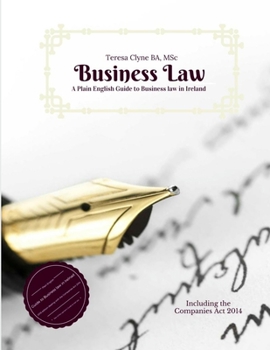A Plain English Guide to Business Law in Ireland: Introduction to Business Law
A Plain English Introduction to Business lawBusiness law (or the law of business organisations) is the area of law concerning companies and other business organisations. This includes corporations, partnerships and other associations which usually carry on some form of economic or charitable activity.If you are a law student or you have, or are thinking about, setting up your own business, this textbook will provide you with an essential grounding in company structure and law within Ireland. The structure of business and the legal requirements for partners, directors, shareholders and company secretaries are crucial in order to ensure that companies stay within the law and avoid costly and potentially devastating leadership mistakes.Legal writing in plain English. Law books using plain English, which is easy to understand using clear concise plain wording. Business law is a broad spectrum in Irish law, is utilises various legal principles and doctrines such as: The law of Contract, The law of Tort, Company law, Consumer law, the law of Agency, Employment law, and of course, the fundamentals of the Irish legal system.The following are covered in this book: The Law of Contract. Formation of a Contract. Offer. Distinction between Offer and Invitation to Treat. Termination of an offer. AcceptanceThe Postal Rule (for acceptance). Intention to Create Legal Relations (intention to be legally bound). Family, Domestic or Social. Commercial Arrangements (courts held that an intention to create legal relations is implied). ConsiderationUnilateral Contracts. Executed and executory consideration. Doctrine of privity of contract. Contents of a ContractCondition. Warranty. Express terms. Implied Terms. Matter of Fact. Officious Bystander Test. Matter of Law. Implied under Statute. Terms implied by the Courts. Implied by Custom. The Parol Evidence Rule. Innominate term. Onus of proof. Mistake. Unilateral or bilateral mistake. Common Mistake. Section 7 of the Sale of Goods Act 1893. Mutual Mistake - Mutual misunderstanding. Unilateral Mistake. Mistaken Identity. Damages. Rectification. Recission. Specific Performance. Exemption Clauses. The legal effects of exemption/limitation clauses. Limitation Clause. Exclusion Clauses. Bars to exclusion/limitation clauses. Misrepresentation. Collateral Undertakings. Unconscionable Bargain. Contra Proferentem. Vitiating factors, discharge and remedy. Duress. Threats Economic. Pressure. Causation. Remedies for Duress. Bars to remedies. Undue Influence. Presumed Undue Influence. Presumed on Relationship. Special relationships. Rebutting the presumption of Undue Influence. Unconscionable Bargain. Misrepresentation. Reliance in fact. Exceptions to silence. Compensation. Recession. Enforcement and Abetment. Damages in Leiu. Partial rescission. Legislation. Void Contracts. Law of Tort. Negligence. Donoghue v Stevenson. Duty of care. Breach. Causation. Remoteness. Reasonable Person. Caparo. Mitigate Losses. Illegality. Consent, volenti non fit injuria. Contributory Negligence. Standard of Care. Law of Agency. Ratification. Estoppel. Emergency/necessity. Employment law. Vicarious liability. Unfair dismissal. Wrongful. Constructive. Redundancy. TUPE transfer of undertakings. Consumer law. Sale of goods and Supply of Services. Consumer protection Act 2007. National Consumer Agency. Company law. Directors duties. Auditors. Board of directors. Debentures. Shares. Company meetings. Ultra vires. Receivership. Examinership. Liquidation. Incorporation. Companies Act 2014
Format:Paperback
Language:English
ISBN:1530177898
ISBN13:9781530177899
Release Date:February 2016
Publisher:Createspace Independent Publishing Platform
Length:552 Pages
Weight:2.78 lbs.
Dimensions:1.1" x 8.5" x 11.0"
Related Subjects
LawCustomer Reviews
0 rating





